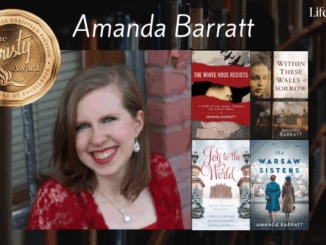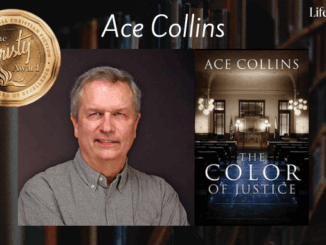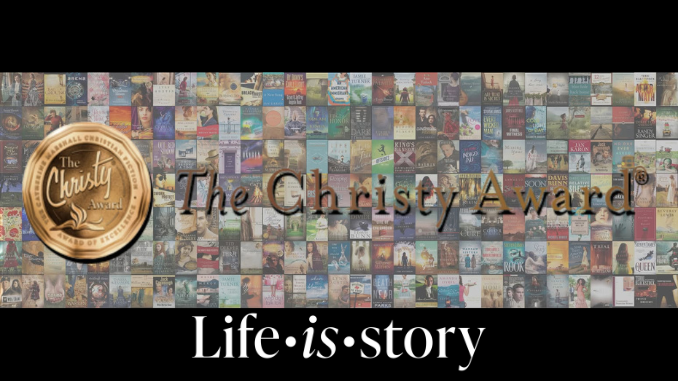
The Complete Guide to the Christy Award (2000–2024)
Since its beginnings in the year 2000, the Christy Award has given out 229 awards to 217 unique works of Christian fiction written or co-written by 147 authors. From 2023-2025, I read or listened to every single Christy Award-winning book—yes, all of them! And what I learned was nothing short of incredible. Join me in here in an overview of the Christy Award by category.
Never Miss Any Christy Award Content
What Is the Christy Award?
The Christy Award is the most prominent honor for Christian fiction, created to recognize excellence in storytelling, faith-driven themes, and literary quality. Named after Catherine Marshall’s beloved novel Christy, the award was established in 2000 as a way to promote and celebrate well-crafted Christian fiction across multiple genres. Over the past two decades, it has become the standard by which Christian novels are judged, shaping trends within the industry and providing a spotlight for both new and established authors.
In its inaugural year, the Christy Award featured six categories, but as the market for Christian fiction evolved, so did the awards. Today, as of 2024, there are nine primary genre categories and two special distinctions: The Amplify Award—highlighting underrepresented voices—and Book of the Year, the top honor recognizing the single most outstanding Christian novel of the year. With 229 awards given to date, the Christy Award continues to elevate authors and stories that combine literary merit with spiritual resonance.
Christy Award by Category (2000–2024)
Below, you’ll find a complete listing of every Christy Award category, covering the very best in Christian fiction. The categories are arranged alphabetically. Each section has a short analysis of each category and my personal favorite from each category. If the category header has a blue link, you can click for an in-depth analysis of that category including all winners and finalists. Those pages are a work in progress and will be rolled out over the next few months. Sign up to the newsletter above to never miss any content.
1. Allegory/Fantasy (2003–2004)
This short-lived category focused on allegory or fantasy lasted only for two years before being merged with the Futuristic category (2000-2004) into the Visionary category (2005-2020). Karen Hancock and publisher Bethany House won both years: 2003 for science fiction allegory Arena and 2004 for the fantasy allegory The Light of Eidon. Prominent finalists include Terri Blackstock and Walter Wangerin, Jr.
My Favorite
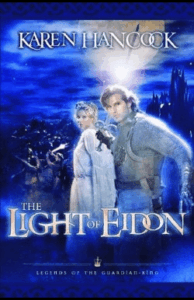
2004 | The Light of Eidon by Karen Hancock (Bethany House) –Abramm has dedicated the last eight years of his life to becoming worthy to touch and tend the Sacred Flames of Eidon, and he expects to be blessed for his devotion and sacrifice. But on the eve of taking the vows that will irrevocably separate him from the life he was born to–as Abramm Kalladorne, fifth son of the king of Kiriath–he is betrayed by his spiritual mentor and sold into slavery by his brothers.
Swept along by the winds of a new destiny, Abramm is forced to compete as a gladiator. When the oppressed masses rally around his success, he discovers his suffering has molded him into something greater than he ever thought possible—to serve a purpose he never imagined.
Set in a world of swords and cloaks, of glittering palaces and mystical temples, of galley ships and ancient mist-bound cities, The Light of Eidon is the first volume of an epic series, LEGENDS OF THE GUARDIAN-KING.
2. Contemporary (2000–2016)
The Contemporary category was one of the six original Christy Award categories, celebrating modern fiction without a dominant romantic plot. It ran until 2016, when it evolved into the General Fiction category. Chris Fabry holds three wins here—Dogwood, Almost Heaven, and Not in the Heart. Other prominent winners include Jan Karon and Charles Martin. The top publisher in this category is Tyndale House with six wins.
My Favorite
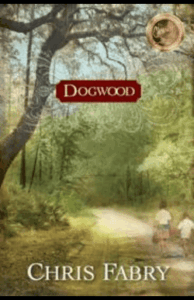 2009 | Dogwood by Chris Fabry (Tyndale) – In the small town of Dogwood, West Virginia, Karin has buried her shattered dreams by settling for a faithful husband whose emotional distance from her deep passions and conflicts leaves her isolated. Loaded with guilt, she tries to raise three small children and “do life” the best she can. Will returns to Dogwood intent on pursuing the only woman he has ever loved–only to find there is far more standing in his way than lost years in prison. The secrets of Will and Karin’s past begin to emerge through Danny Boyd, a young boy who wishes he hadn’t survived the tragedy that knit those two together as well as tore them apart. The trigger that will lay their pain bare and force them to face it rather than flee is the unlikely figure of Ruthie Bowles, a withered, wiry old woman who leads Karin so deep into her anger against God that it forces unexpected consequence.
2009 | Dogwood by Chris Fabry (Tyndale) – In the small town of Dogwood, West Virginia, Karin has buried her shattered dreams by settling for a faithful husband whose emotional distance from her deep passions and conflicts leaves her isolated. Loaded with guilt, she tries to raise three small children and “do life” the best she can. Will returns to Dogwood intent on pursuing the only woman he has ever loved–only to find there is far more standing in his way than lost years in prison. The secrets of Will and Karin’s past begin to emerge through Danny Boyd, a young boy who wishes he hadn’t survived the tragedy that knit those two together as well as tore them apart. The trigger that will lay their pain bare and force them to face it rather than flee is the unlikely figure of Ruthie Bowles, a withered, wiry old woman who leads Karin so deep into her anger against God that it forces unexpected consequence.
3. Contemporary Romance (2000–Present)
Dedicated to Christian romance, this category has been a consistent presence since the very beginning. The only exception is that from 2006-2008, the winning novels were set in the 1800s and in 2014 and 2016, the category was officially termed Contemporary Romantic Suspense. Becky Wade is the standout author here, with four wins in five years for Her One and Only, True to You, Falling for You, and Stay with Me. Other prominent winners include Dee Henderson and DiAnn Mills. Bethany House leads all publishers in this category with eleven wins.
My Favorite
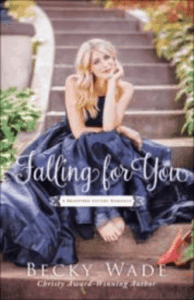 2019 | Falling for You by Becky Wade (Bethany House)
2019 | Falling for You by Becky Wade (Bethany House)
Famously beautiful model Willow Bradford is taking a temporary break from her hectic schedule to work as the innkeeper at her family’s small-town bed-and-breakfast. She was enjoying the peace of her hometown, Merryweather, Washington, right up until she came face-to-face with Corbin Stewart, the man she loves to hate. A thoughtful rule-follower by nature, Willow threw caution to the wind four years ago when she entrusted her heart to Corbin–and suffered the consequences when it all fell apart.
Former NFL quarterback Corbin is forceful, charming, and accustomed to getting what he wants . . . except where Willow Bradford is concerned. Unable to forget her, he’s never stopped regretting what happened between them. When their paths unexpectedly cross again, he’s determined to make her give him a second chance.
When a decades-old missing persons case finds Corbin and Willow working together, they’re forced to confront their past and who they’ve become–and whether they can risk falling for one another all over again.
4. Contemporary Series (2006–2016)
The Contemporary Series category was meant for works of contemporary fiction that functioned as part of a larger series. Over its eleven-year run, five of the winners were the first novels in a series—with one series only reaching two books—which is perhaps why the category was retired. Susan May Warren and Mindy Starns Clark were the only authors to win this category more than once. Warren won in consecutive years for You Don’t Know Me and Take a Chance on Me. Ironically, these books are not in the same series. Clark also won hers in two different series and with two different co-authors: The Amish Midwife (with Leslie Gould) and The Amish Blacksmith (with Susan Meissner). Other prominent winners include Beverly Lewis (her only Christy win!) and Jan Karon (her second and only solo-authored win).
My Favorite
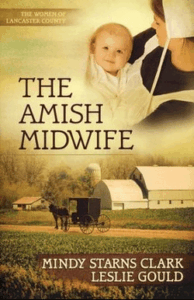 2012 | The Amish Midwife by Mindy Starns Clark & Susan Meissner (Harvest House) – A dusty carved box containing two locks of hair and a century-old letter regarding property in Switzerland, and a burning desire to learn about her biological family lead nurse-midwife Lexie Jaeger from her home in Oregon to the heart of Pennsylvania Amish country. There she meets Marta Bayer, a mysterious lay-midwife who desperately needs help after an Amish client and her baby die.
2012 | The Amish Midwife by Mindy Starns Clark & Susan Meissner (Harvest House) – A dusty carved box containing two locks of hair and a century-old letter regarding property in Switzerland, and a burning desire to learn about her biological family lead nurse-midwife Lexie Jaeger from her home in Oregon to the heart of Pennsylvania Amish country. There she meets Marta Bayer, a mysterious lay-midwife who desperately needs help after an Amish client and her baby die.
Lexie steps in to assume Marta’s patient load even as she continues the search for her birth family, and from her patients she learns the true meaning of the Pennsylvania Dutch word demut, which means “to let be” as she changes from a woman who wants to control everything to a woman who depends on God.
A compelling story about a search for identity and the ability to trust that God securely holds our whole life—past, present, and future.
5. First Novel (2001–Present)
This category celebrates debut authors. Interesting, both the youngest and oldest Christy Award winners come from this category. Anne Elisabeth Stengl became the youngest Christy winner in 2011 at age 25 with Heartless, while Patricia Raybon became the oldest in 2022 at age 73 with All That Is Secret. This category also features the only posthumously awarded Christy as 2005 winner Cliff Coon passed away between the publication of his novel The Mending String and the award announcement.
My Favorite
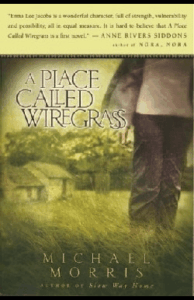 2003 | A Place Called Wiregrass by Michael Morris (RiverOak) –
2003 | A Place Called Wiregrass by Michael Morris (RiverOak) –
6. Futuristic (2000–2004)
Created during the height of the Left Behind craze, this category featured time travel, dystopian, and near-future stories. While the Left Behind books would make the finals four times, none of them managed to win. However, Left Behind co-author Jerry Jenkins did manage his sole Christy award win in this category’s final year with his novel, Soon. Futuristic merged with Allegory/Fantasy (2003-2004) in 2005.
My Favorite
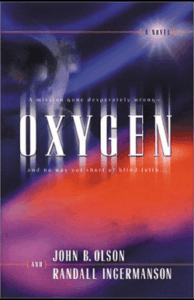 2002 | Oxygen by John B. Olson and Randall Ingermanson (Bethany House) – Valkerie Jansen is tough, beautiful, and has an uncanny knack for survival. But that doesn’t explain why NASA picks her to be part of a two man, two woman crew to Mars — or does it?
2002 | Oxygen by John B. Olson and Randall Ingermanson (Bethany House) – Valkerie Jansen is tough, beautiful, and has an uncanny knack for survival. But that doesn’t explain why NASA picks her to be part of a two man, two woman crew to Mars — or does it?
Bob Kaganovski, the ship’s mechanic, is paid to be paranoid — and he’s good at it. After a teeth-rattling launch, Bob realizes that his paranoia hasn’t prepared him for this trip. He can deal with a banged-up ship, but how’s he going to survive the next five months with HER just a flimsy partition away?
Halfway to the Red Planet, an explosion leaves the crew with only enough oxygen for one. All evidence points to sabotage — and Valkerie and Bob are the obvious suspects.
Oxygen is a witty, multi-award-winning roller coaster ride, with a plot that moves at the speed of light.
7. General Fiction (2017–Present)
The General Fiction Category took over from the Contemporary category 2017, becoming the primary place for standalone, contemporary fiction where romance is not the primary plot. Katie Ganshert (Life After and No One Ever Asked) and Katie Powner (Where the Blue Sky Begins and The Wind Blows in Sleeping Grass) are the two multi-Christy winners from this category. Amanda Cox and Chris Fabry are other notable winners.
My Favorite
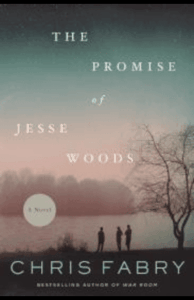 2017 | The Promise of Jesse Woods by Chris Fabry (Tyndale) – The summer of 1972 was the most pivotal of Matt Plumley’s childhood. While his beloved Pirates battle for back-to-back World Series titles, Matt’s family moves from Pittsburgh to Dogwood, West Virginia, where his father steps into the pulpit of a church under the thumb of town leader Basil Blackwood. A fish out of water, Matt is relieved to forge a fast bond with two unlikely friends: Dickie Darrel Lee Hancock, a mixed-race boy, and Jesse Woods, a tough-as-nails girl with a sister on her hip and no dad in sight.
2017 | The Promise of Jesse Woods by Chris Fabry (Tyndale) – The summer of 1972 was the most pivotal of Matt Plumley’s childhood. While his beloved Pirates battle for back-to-back World Series titles, Matt’s family moves from Pittsburgh to Dogwood, West Virginia, where his father steps into the pulpit of a church under the thumb of town leader Basil Blackwood. A fish out of water, Matt is relieved to forge a fast bond with two unlikely friends: Dickie Darrel Lee Hancock, a mixed-race boy, and Jesse Woods, a tough-as-nails girl with a sister on her hip and no dad in sight.
As the trio traipses the hills and hollers, Matt begins to fall for Jesse, and their promises to each other draw him deeper into her terrifying reality. One night, the wrath of the Blackwoods and the secrets of Jesse’s family collide, and Matt joins Jesse in a rescue that saves one life and ends another . . . and severs the bond of their friendship.
Years later, Matt is pulled back to Dogwood and to memories of that momentous summer by news of Jesse’s upcoming wedding. He could never shake the feeling that there was more to the story of that fateful night, and he’s determined to learn the truth behind the only promise Jesse Woods ever broke.
View all General Fiction winners →
Back to Top ↑
8. Historical (2004–Present)
For the first four years of the Christy Awards, historical novels were divided into North American and International. Beginning in 2004, the categories merged into a singular category, with Historical Romance being added in 2009 to further focus the Historical category on works of fiction broadly set in the past. Nine of the twenty-one winners are set during WWII. A further four are set in a biblical setting. Lynn Austin is the big winner in this category with six (of a record eight!) Christy Awards in this category. The other big winner is Amanda Barratt, who has won the category three times for her novels The White Rose Resists, Within These Walls of Sorrow, and The Warsaw Sisters. Bethany House is the top publisher here with nine wins.
My Favorite
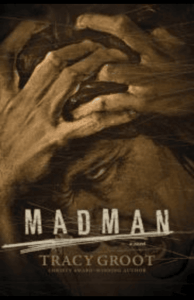 2007 | Madman by Tracy Groot (Moody) – If there is a way into madness, logic says there is a way out. Logic says. Tallis, a philosopher’s servant, is sent to a Greek academy in Palestine only to discover that it has silently, ominously, disappeared. No one will tell him what happened, but he learns what has become of four of its scholars. One was murdered. One committed suicide. One worships in the temple of Dionysus. And one … one is a madman. From the author of The Brother’s Keeper comes a tale of mystery, horror, and hope in the midst of unimaginable darkness, the story behind the Geresene demoniac of the gospels of Mark and Luke.
2007 | Madman by Tracy Groot (Moody) – If there is a way into madness, logic says there is a way out. Logic says. Tallis, a philosopher’s servant, is sent to a Greek academy in Palestine only to discover that it has silently, ominously, disappeared. No one will tell him what happened, but he learns what has become of four of its scholars. One was murdered. One committed suicide. One worships in the temple of Dionysus. And one … one is a madman. From the author of The Brother’s Keeper comes a tale of mystery, horror, and hope in the midst of unimaginable darkness, the story behind the Geresene demoniac of the gospels of Mark and Luke.
9. Historical Romance (2009–Present)
Created in 2009 in recognition of a crowded historical field, this category focuses on historical novels where romance is the primary or a prominent theme. The Regency Era (early 1800s) is the most common setting with three winners from that time period, but there’s quite a diversity of times portrayed here, from biblical fiction (Tessa Afshar’s Harvest of Gold) to the 1950s (Patti Callahan’s Becoming Mrs. Lewis). Julie Klassen is the queen of Christian Historical Romance, winning three Christys in this category for her novels The Silent Governess, The Girl in the Gatehouse, and The Maid of Fairbourne Hall. Bethany House is the top publisher here with seven wins.
My Favorite
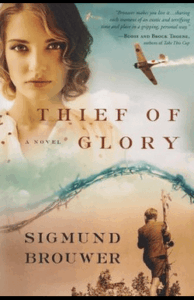 2015 | Thief of Glory by Sigmund Brouwer (WaterBrook) – A boy coming of age in a time of war…the love that inspires him to survive.
2015 | Thief of Glory by Sigmund Brouwer (WaterBrook) – A boy coming of age in a time of war…the love that inspires him to survive.
For ten year-old Jeremiah Prins, a life of privilege as the son of a school headmaster in the Dutch East Indies comes crashing to a halt in 1942. When the Japanese Imperialist army invades the Southeast Pacific, and his father and older stepbrothers are separated from the rest of the family, Jeremiah takes on the responsibility of caring for his younger siblings. But he is surprised by what life in the camp reveals about his frail, troubled mother—a woman he barely knows.
Amidst starvation, brutality, sacrifice and generosity, Jeremiah draws on all of his courage and cunning to fill in the gap his father and brothers left behind. Life in the camps is made more tolerable as Jeremiah’s boyhood infatuation with his close friend Laura deepens into a friendship from which they both draw strength.
10. International Historical (2000–2003)
The International Historical category is one of the six original Christy Award categories. It focused on historical novels set outside of North America. Its four winners included one novel set in post-Cold War Europe (which was barely a historical event at the time), two WWII novels set in Germany, and a Biblical fiction novella. This category is responsible for Francine Rivers’ lone Christy Award—Unashamed, a fictionalized retelling of Rahab’s story. Jack Cavanaugh dominated the category with two wins for his WWII novels While Mortals Sleep and His Watchful Eye.
My Favorite
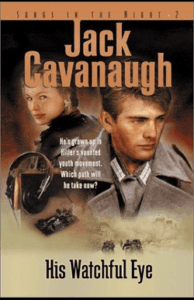
2003 | His Watchful Eye by Jack Cavanaugh (Bethany House) –
World War II. The army of the Third Reich. Konrad Reichmann, a model of Hitler’s youth movement, becomes disillusioned as the reality of the Russian front bears no resemblance to the glory the Fuhrer portrayed in his speeches. Even lower than his unit’s morale are supplies and fuel as Russia’s winter sets in. When the slaughter of innocents opens his eyes to the true nature of the Reich, Konrad embarks upon a bold and dangerous plan to put a stop to the horror and change the course of history.
11. Lits (2007–2008)
Only lasting for two years, the Lits category was meant for shorter, lighter-hearted women’s fiction—then commonly called chick-lit. It wasn’t a very successful category was discontinued after only two years. Robin Jones Gunn won in 2007 for Sisterchicks in Gondolas, part of her Sisterchicks! series. Shelly Beach won in 2008 for Hallie’s Heart.
My Favorite
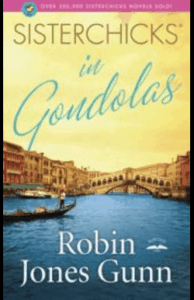 2007 | Sisterchicks in Gondolas by Robin Jones Gunn – SISTERCHICK n. : a friend who shares the deepest wonders of your heart, loves you like a sister, and provides a reality check when you’re being a brat.
2007 | Sisterchicks in Gondolas by Robin Jones Gunn – SISTERCHICK n. : a friend who shares the deepest wonders of your heart, loves you like a sister, and provides a reality check when you’re being a brat.
When Jenna is invited to Venice for a week of cooking for a small retreat group, she knows just who to take her sister-in-law Sue. With her Dallas drawl and wild tangle of red hair, Sue desperately needs her own retreat from the pressures of the past two years…and blessedly for their guests, Sue actually knows how to cook (unlike Jenna)!
With about six words of Italian between them, a map, and a keen appetite for gelato, they puzzle out the lovely city together. During their stay, Jenna and Sue become victims of grace in ways they never expected—starting with their a restored fifteenth-century palace on a quiet canal complete with a stairwell perfect for mattress sledding!
Coming out of a time of dark shadows in their lives, these two friends dive into a new season of refreshing and realize that sometimes when serving God, the most important thing to do is just show up…and watch for goodness and mercy to follow close behind. Come join Jenna and Sue over boiling pots of pasta in this lilting gondola-paced adventure!
12. Mystery/Suspense/Thriller (2000–Present)
While the precise name of this category alternated between Mystery/Suspense/Thriller (2000-2006, 2009, 2017-2024) and simply Suspense (2007-2008, 2010-2016), this category has been around since the beginning and always been the Christy award for more intense Christian fiction. This is also the only long-running category to have more men win than woman with 17 of the 25 Christy Award winners in this category going to men. Steven James won four of Christy Awards in this category (The Rook, The Bishop, The Queen, and Every Wicked Man). Ted Dekker, Athol Dickson, and T. Davis Bunn won three each.
My Favorite
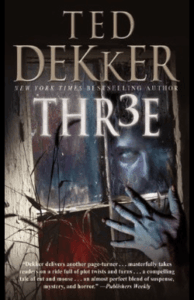 2004 | Thr3e by Ted Dekker (Thomas Nelson) – By all accounts seminary student Kevin Parsins is leading a good, if not virtuous, life. But like all people, Kevin has his secrets. And someone wants them revealed.
2004 | Thr3e by Ted Dekker (Thomas Nelson) – By all accounts seminary student Kevin Parsins is leading a good, if not virtuous, life. But like all people, Kevin has his secrets. And someone wants them revealed.
While driving home from a day at graduate school, Kevin receives a call from a mysterious stranger who calls himself Slater. Slater demands Kevin confess his sin in the next three minutes or the vehicle he is manning will be blown to pieces.
Thus starts a harrowing chain of events. After narrowly escaping his exploding car, Kevin continues to receive phone calls from Slater, each with another riddle, another consequence, and another three minutes to confess his sin.
The problem is Kevin is unsure of what that sin might be. And Slater’s cycle won’t stop until he figures it out.
13. North American Historical (2000–2003)
One of the six original Christy Award genres, North American Historical merged with International Historical in 2004 to create one combined Historical category (2004-). The five winning novels from this category (there were two winners in 2001) include the first two of Lynn Austin’s Christy Awards—Hidden Places and Candle in the Darkness. Janette Oke received her one and only Christy Award in this category for her novel The Meeting Place, co-authored with Lynn Austin.
My Favorite
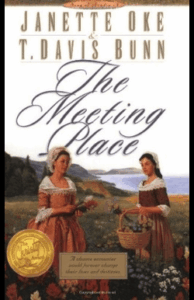 2000 | The Meeting Place by Janette Oke and T. Davis Bunn – A Chance Encounter Forever Changed Their Lives–and Destinies. Crafted by two masters of inspirational fiction–Janette Oke and T. Davis Bunn–and combining the engaging historical settings, rich characterization, and heartwarming messages quintessential to both authors, The Meeting Place is another timeless story for you to cherish.
2000 | The Meeting Place by Janette Oke and T. Davis Bunn – A Chance Encounter Forever Changed Their Lives–and Destinies. Crafted by two masters of inspirational fiction–Janette Oke and T. Davis Bunn–and combining the engaging historical settings, rich characterization, and heartwarming messages quintessential to both authors, The Meeting Place is another timeless story for you to cherish.
Set along the rugged coastline of 18th century Canada in what was then called Acadia (now Nova Scotia and New Brunswick), The Meeting Place re-creates a world that was home to native Indians, French settlers, and English garrisons. Such diverse populations did not live in accord, however. Instead, they were isolated within their own groups by a brewing political tension under the difficult English rule.
Amid such chaotic times two women, both about to become brides and both trying to live lives of quiet peace, meet in a lush field of wildflowers. Louisa, a Frenchwoman, and Catherine, who is English, continue to meet secretly through the seasons, sharing both friendship and growing faith.
The outside world does not mirror their own tranquil happiness, and the dreaded crackdown by the English throne threatens far more than their growing bond. In the face of a heart-wrenching dilemma, Louisa and Catherine strive to maintain their faith and cling to their dreams of family and home.
View all North American Historical winners →
Back to Top ↑
14. Short Form (2017–Present)
Beginning in 2017, the Christy Award added a category for fiction under 60,000 words. Winners in this category have often evoked a holiday theme with six of the seven winners having a Christmas setting. The first four years (2017-2020) featured standalone winners while recent years (2021-2024) have had winners that were part of an anthology.
My Favorite
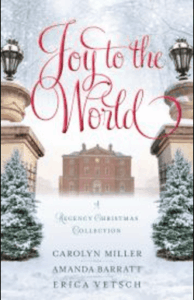
2021 | “Far as the Curse is Found” by Amanda Barratt in Joy to the World (Kregel) –
In Joy to the World, three popular romance authors come together to offer a heartwarming collection of holiday Regency romance. Based on lines from a beloved Christmas carol, these three novellas have depth, faith, and satisfying stories all packed into the perfect length for readers to curl up and take a brief break from their holiday busyness.
“Far as the Curse Is Found” by Amanda Barratt — One winter night, a woman struggling to provide for her illegitimate child encounters a scarred veteran of the Napoleonic Wars on the streets of London. Can love conquer the darkness of two broken pasts?
15. Speculative (2021–Present)
The Speculative category replaced the longstanding Visionary category, which ran from 2005-2020. Like Visionary, this is a wide-ranging category that includes fantasy, science fiction, or any novel with supernatural/paranormal element. Sharon Hinck dominated this award for its first three years, winning with her novels Forsaken Island, Windward Shore, and Dream of Kings. Additionally, as of 2024, Enclave Publishing is responsible for half (7 of 14) Speculative finalists.
My Favorite
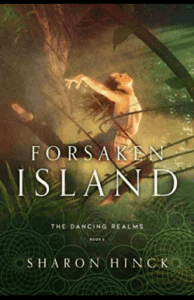 2021 | Forsaken Island by Sharon Hinck (Enclave) – On an uncharted world, happiness is effortless and constant … but can true joy exist without sacrifice?
2021 | Forsaken Island by Sharon Hinck (Enclave) – On an uncharted world, happiness is effortless and constant … but can true joy exist without sacrifice?
The people of Meriel have long believed their island world floats alone in the vast ocean universe, so they are astonished when another island drifts into view. With resources becoming scarce, Carya and Brantley quickly volunteer to search the new land for supplies.
After navigating a barrier of menacing trees, the pair encounter a culture of perpetually happy people who readily share their talents and their possessions. But all is not what it seems. At the core of the island is a horror that threatens everyone, including Brantley and Carya.
Freeing the villagers of the bondage they’ve chosen may cost Carya and Brantley more than they could have imagined. Even if the two succeed, they’ll have to find a way to return to Meriel quickly … or be cut off from their home forever.
16. Visionary (2005–2020)
The forerunner of the Futuristic (2000-2004) and Speculative (2021-) categories, Visionary was a wide-ranging category that includes fantasy, science fiction, or any novel with supernatural/paranormal element. Of the fifteen winners, nine belong to the fantasy genre, five are supernatural/paranormal, and one is horror/apocalyptic. James Rubart is the king of this category, winning four Christy Awards in this category, including three consecutive from 2016-2018. Karen Hancock, Jill Williamson, and Anne Elisabeth Stengl are all two-time winners.
My Favorite
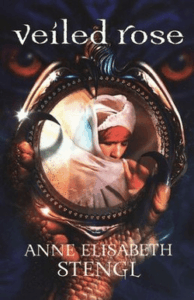 2012 | Veiled Rose by Anne Elisabeth Stengl (Bethany House) – Rose Red trusts no one with her secret. She hides in the forest, her face veiled in rags, shunning the company of all save her old father and her nanny goat. Her life is bleak and lonely.
2012 | Veiled Rose by Anne Elisabeth Stengl (Bethany House) – Rose Red trusts no one with her secret. She hides in the forest, her face veiled in rags, shunning the company of all save her old father and her nanny goat. Her life is bleak and lonely.
Until she meets a privileged young man sent to spend his summer in the mountains. Headstrong young Leo startles everyone by befriending Rose Red, and together they begin searching for the monster rumored to be stalking these lands.
But the hunt, which began as a game, holds greater risk than either imagines. Soon both are forced to test their trust in each other as a far more terrifying scourge puts their entire land at risk.
17. Western (2002–2003)
A short-lived and mostly unneeded category that ran only for two years, the Western category was Stephen Bly, who was responsible for four of the six total finalists. Bly won the 2002 award for The Long Trail Home while R. William Rogers won in 2003 for Toward a New Beginning.
My Favorite
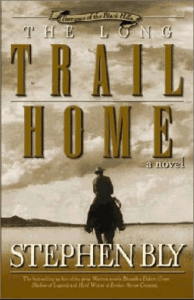 2002 | The Long Trail Home by Stephen Bly (B&H Publishing) – The second son of Brazos Fortune, Samuel, is somewhat the lost sheep of the Fortune family. After he is run out of Texas, he ends up hiding out with his father and brother. Although he struggles to escape the consequences of his previous lifestyle, he refuses to talk about the past.
2002 | The Long Trail Home by Stephen Bly (B&H Publishing) – The second son of Brazos Fortune, Samuel, is somewhat the lost sheep of the Fortune family. After he is run out of Texas, he ends up hiding out with his father and brother. Although he struggles to escape the consequences of his previous lifestyle, he refuses to talk about the past.
Brazos has to deal with sending Samuel back to Texas to make amends or allowing him to have a new start in Dakota. To make things even more complicated, Samuel decides to marry a divorced woman with several children and a questionable reputation. Through it all, Samuel never gives up his Christian heritage.
18. Young Adult (2007–Present)
The Young Adult category is for any novel of any genre geared to a younger audience, including novels that could be would classified as Middle Grade. Seven of the 18 awards (as of 2024) fall into the fantasy genre, with six in historical, three in general fiction, and two speculative. Cathy Gohlke and Melanie Dickerson have each won multiple Christy Awards in this category.
My Favorite
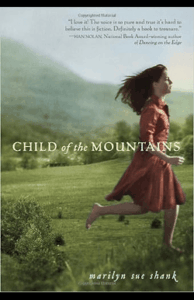 2013 | Child of the Mountains by Marilyn Sue Shank (Delacorte Press) – Growing up poor in 1953 in the Appalachian Mountains of West Virginia doesn’t bother Lydia Hawkins. She treasures her tight-knit family. There’s her loving mama, now widowed; her whip-smart younger brother, BJ, who has cystic fibrosis; and wise old Gran. But everything falls apart after Gran and BJ die and mama is jailed unjustly. Suddenly Lydia has lost all those dearest to her.
2013 | Child of the Mountains by Marilyn Sue Shank (Delacorte Press) – Growing up poor in 1953 in the Appalachian Mountains of West Virginia doesn’t bother Lydia Hawkins. She treasures her tight-knit family. There’s her loving mama, now widowed; her whip-smart younger brother, BJ, who has cystic fibrosis; and wise old Gran. But everything falls apart after Gran and BJ die and mama is jailed unjustly. Suddenly Lydia has lost all those dearest to her.
Moving to a coal camp to live with her uncle William and aunt Ethel Mae only makes Lydia feel more alone. She is ridiculed at her new school for her outgrown homemade clothes and the way she talks, and for what the kids believe her mama did. And to make matters worse, she discovers that her uncle has been keeping a family secret—about her.
If only Lydia, with her resilient spirit and determination, could find a way to clear her mother’s name..
19. Amplify (2022–Present)
The Amplify Award is a special Christy Award meant to highlight historically excluded and underrepresented ethnic and culture perspectives by authors of color. It is open to Christian fiction authors who identify as an ethnic minority and have used that experience in their storytelling. Novels must also be submitted into one of the nine genre categories.
My Favorite
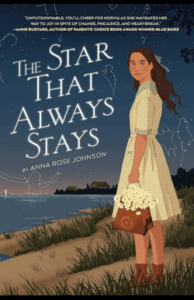 2023 | The Star that Always Stays by Anna Rose Johnson (Holiday House) – When bright and spirited Norvia moves from the country to the city, she has to live by one new rule: Never let anyone know you’re Ojibwe.
2023 | The Star that Always Stays by Anna Rose Johnson (Holiday House) – When bright and spirited Norvia moves from the country to the city, she has to live by one new rule: Never let anyone know you’re Ojibwe.
Growing up on Beaver Island, Grand-père told Norvia stories—stories about her ancestor Migizi, about Biboonke-o-nini the Wintermaker, about the Crane Clan and the Reindeer Clan. He sang her songs in the old language, and her grandmothers taught her to make story quilts and maple candy. On the island, Norvia was proud of her Ojibwe heritage.
Things are different in the city. Here, Norvia’s mother forces her to pretend she’s not Native at all—even to Mr. Ward, Ma’s new husband, and to Vernon, Norvia’s irritating new stepbrother. In fact, there are a lot of changes in the city: ten-cent movies, gleaming soda shops, speedy automobiles, ninth grade. It’s dizzying for a girl who grew up on the forested shores of Lake Michigan.
Despite the move, the upheaval, and the looming threat of world war, Norvia and her siblings—all five of them—are determined to make 1914 their best year ever. Norvia is certain that her future depends upon it… and upon her discretion.
But how can she have the best year ever if she has to hide who she truly is?
The Star That Always Stays is directly inspired by Anna Rose Johnson’s family history.
20. Book of the Year (2014–Present)
Book of the Year is a special Christy Award chosen by the Christy Award board. While it is usually chosen from one of the genre-based category award-winners, the one exception to that is 2017’s Long Way Gone by Charles Martin, which won despite losing to The Promise of Jesse Woods in its genre. This is the top annual award for Christian Fiction.
My Favorite
 2015 | Thief of Glory by Sigmund Brouwer (WaterBrook) – A boy coming of age in a time of war…the love that inspires him to survive.
2015 | Thief of Glory by Sigmund Brouwer (WaterBrook) – A boy coming of age in a time of war…the love that inspires him to survive.
For ten year-old Jeremiah Prins, a life of privilege as the son of a school headmaster in the Dutch East Indies comes crashing to a halt in 1942. When the Japanese Imperialist army invades the Southeast Pacific, and his father and older stepbrothers are separated from the rest of the family, Jeremiah takes on the responsibility of caring for his younger siblings. But he is surprised by what life in the camp reveals about his frail, troubled mother—a woman he barely knows.
Amidst starvation, brutality, sacrifice and generosity, Jeremiah draws on all of his courage and cunning to fill in the gap his father and brothers left behind. Life in the camps is made more tolerable as Jeremiah’s boyhood infatuation with his close friend Laura deepens into a friendship from which they both draw strength.


